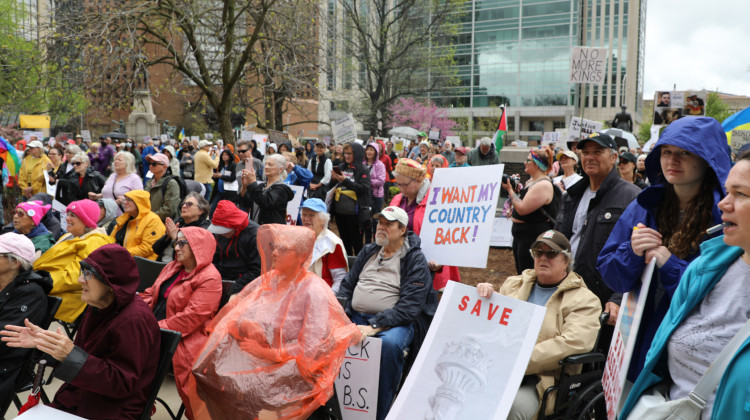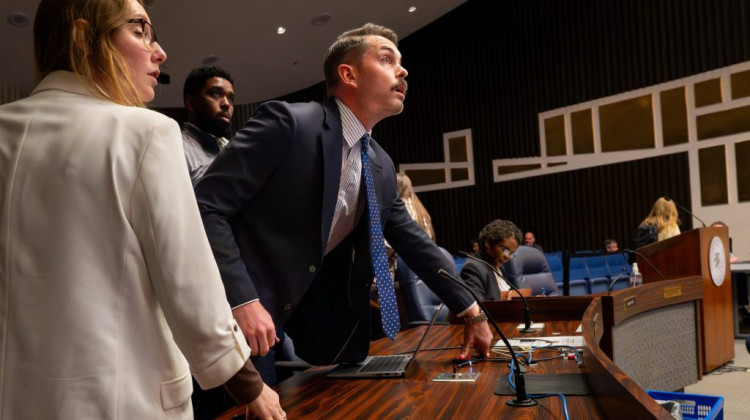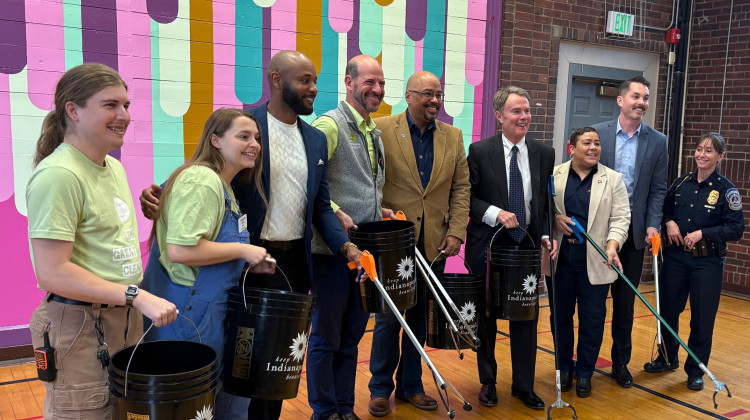
WFYI criminal justice reporter interviews IMPD Officer Damon Young on Dec. 11, 2023.
Ben Thorp/WFYI NewsIndianapolis has seen a surge in officer-involved shootings this year. WFYI’s criminal justice reporter Katrina Pross spoke with Indianapolis police officer Damon Young to talk about the department’s training in the use of force.
This interview has been edited for length and clarity.
Katrina Pross, WFYI: Can you tell me about what you do at IMPD? What's your job?
Damon Young, IMPD: So I am the lead instructor for our verbal de-escalation program, as well as the lead instructor for our physical tactics – the defensive tactics, or combatives portion of our hands-on training.
Pross: This year we've had 18 officer-involved shootings, the highest yearly count since 2015. Can you explain to us when officers are allowed to use deadly force?
Young: So officers are allowed to use deadly force when they have probable cause to believe that it's necessary to stop the commission of a forcible felony, or to prevent SBI [serious bodily injury] that's imminent to a third party or that officer. So if it's necessary to stop the resistive behavior, and that resistive behavior has risen to a very high level, then they're allowed to use deadly force.
Pross: Several people who were shot by IMPD officers this year appeared to be experiencing mental health issues. How should officers approach those situations?
Young: Well, it would be nice if our officers knew that when they first encountered that person, but none of us have a blinking sign over our head saying, “Hey, I have this mental condition.” We don't have that luxury. However, our officers do get training in the academy, through the Mental Health First Aid, and through our crisis intervention training, where there are symptoms that people who have mental illnesses may present to the officer, whether that's erratic speech, physical mannerisms, or emotions that may not appear to be typical. Some way of indicating to the officer, this person's not functioning at the same level mentally, as what we would consider a normally-functioning human does.
And so officers should recognize that and if that person is not demonstrating behavior right now, that is a danger to a third party or a danger to themselves, then our officers have the training to make some distance, slow things down, use time to your advantage.
Pross: What response do you have to the recent spike in shootings? What have you heard from others in the department?
Young: Well, I think it's really scary to see that we're having such an increase in this significantly high level of resistance towards our officers. I think our officers on the street are experiencing a world that's different, meaning 10 years ago, we didn't have the same environment that we do now. We didn't have the same thoughts going out across the social media platforms that are now. And so we have seen an increase in segments of society that are demonstrating levels of resistance that are very high, and our officers are having to still work and still protect the rest of our citizens who aren't doing those things.
And when people are demonstrating these high levels of resistance, our officers have to make very quick decisions, life or death decisions, sometimes so fast, that it's not really necessarily a conscious thought. It's subconsciously, this is what my training has taught me to do. The stimulus that I'm getting right now is this person is showing me a firearm, and they are moving it in a way that they're going to point it at me to pull the trigger. So I need to pull my trigger. Well, that conscious thought doesn't happen. It's training. In training, a gun is raised up, we respond with deadly force.
And it happens so fast sometimes that subconsciously the brain protects the officer, instead of the officer having time to sit back and analyze like the rest of us have the luxury of doing when we can sit in our chairs and watch the video play and pause it and go and get a hot cocoa and then come back and finish the video. Our officers don't get to do that. They have to react right now or they may not be going home.
Contact WFYI criminal justice reporter Katrina Pross at kpross@wfyi.org.
Pross is a Corps Member of Report for America, an initiative of The GroundTruth Project.
 DONATE
DONATE






 Support WFYI. We can't do it without you.
Support WFYI. We can't do it without you.